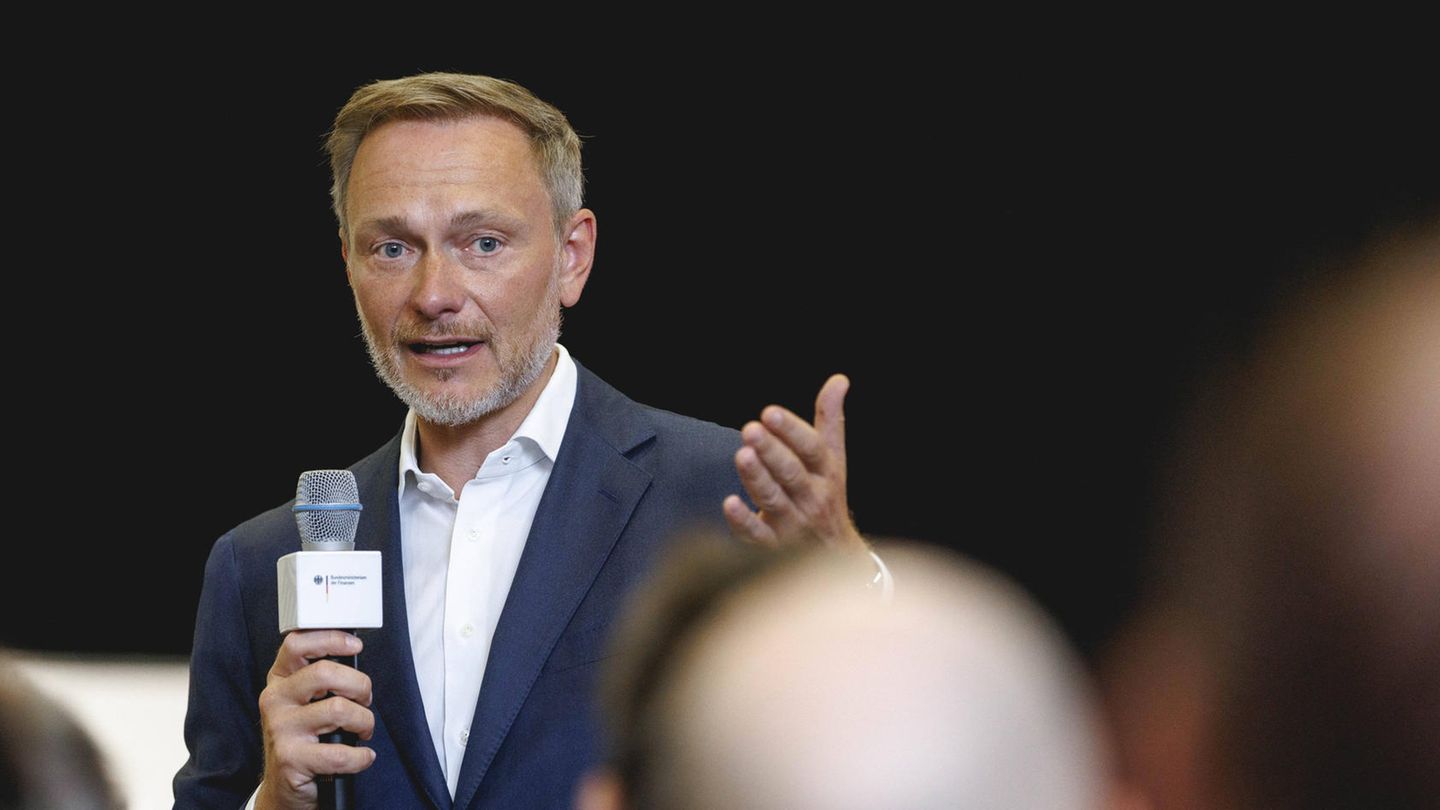On site
In the budget dispute, parts of the SPD and the Greens are angry with the finance minister. However, Christian Lindner is likely to gain momentum from a citizens’ dialogue in Potsdam.
Christian Lindner had to wait until two minutes before the end to hear how those present viewed what was troubling Berlin’s political agenda during the summer lull: the budget. “Mr. Debt Brake” himself did not address the issue at the “Citizens’ Dialogue”. The Federal Finance Minister and FDP Chairman said at the outset that he had decided that the discussion should focus on what interested and concerned the 60 or so people present.
For the citizens in the Schinkelhalle in Potsdam, this is not the current budget dispute, but the slow digitization of schools, the difficulties of the pension insurance system, the tense housing market, the controversial speed limit or the overly complicated tax returns.
It has been unclear for four days whether Lindner can even continue to address such issues in this federal government. Everything depends on whether the traffic light coalition in the Bundestag agrees on the budget – or whether it fails to do so.
Budget dispute: “Limit of what is tolerable”
The problem actually seemed to have been solved: at the beginning of July, after weeks of negotiations, SPD Chancellor Olaf Scholz, Green Vice Chancellor Robert Habeck and Lindner presented a compromise on the budget that was intended to plug a gap of at least 30 billion euros. Since the Federal Constitutional Court’s budget ruling last November, it was obvious that after the budget for 2024, the budget for 2025 would also be a major undertaking. With the agreement, the leaders of the coalition wanted to prove the doubters wrong.
Just a few weeks later, however, it is clear that the coalition has not solved its budget problem. Lindner had several of the measures in the draft budget assessed by experts. After these reviews, his finance ministry came to the conclusion that some of the planned tricks were not sustainable and that the painstakingly achieved agreement would have to be renegotiated. Lindner now sees a gap of five billion euros.
With a budget of 480 billion euros, that sounds comparatively little, but it has reignited the dispute within the coalition. Parts of the SPD and the Greens accuse the finance minister of having unilaterally terminated the budget compromise. The reports do not necessarily indicate a need to renegotiate the budget, said SPD leader Saskia Esken. The fact that Lindner made this assessment “without any coordination in the government” and made it public, she said, exceeded “the limits of what is tolerable in a coalition.”
Andreas Audretsch, deputy leader of the Green Party, also said: “There is no reason to renegotiate.” It is also clear that there will be no “cutting costs to the point of ruining social cohesion and climate protection.” The FDP, on the other hand, expects proposals for savings from the SPD and the Greens. Sources in the Finance Ministry say that these could also be measures “to strengthen the accuracy of social spending.”
Citizens’ dialogue: “Nothing can come after this”
This is a major contentious issue for the coalition – but one that is only discussed in Potsdam shortly before the end of the event. He doesn’t really have a question, says a man with a bald head and a bright blue polo shirt, but he just wants to express his thanks and a wish. “I think it’s great that you had this draft budget examined.” Especially that this examination took place before the measures were adopted. And he hopes “that you remain stable there,” he says to Lindner.
Although he himself has no children, the issue of intergenerational justice is something that concerns him. That is why the debt brake is so important. Lindner’s FDP and he himself must “stay strong,” the man said. It is the only time during the event that there is applause in the hall.
Lindner might not have dreamed that his “Citizens’ Dialogue” would be so beautiful: “Nothing can come after that,” says the Finance Minister and ends the event. After a few selfies in the hall, he takes the tailwind of support with him, not without concealment, to the press representatives who are waiting for him with cameras and recording devices – and, unlike the citizens, only have questions about the budget.
Lindner’s answers are routine. In addition to the fact that taxes for the “working middle” should not be increased, it is also clear that there should be no exceptions to the debt brake, for example on the basis of an emergency resolution. “That was also expressed here at the event,” he says: “That it is a major priority that we have sustainable public finances.”
Lindner is thus reaffirming his rejection of the SPD, which is still committed to declaring a state of emergency because of the war in Ukraine and taking out additional loans. This may come as little surprise, but it is also clear in Potsdam: the finance minister will not budge on these issues. Christian Lindner apparently wants to “remain stable”, as the citizen put it.
Source: Stern
I have been working in the news industry for over 6 years, first as a reporter and now as an editor. I have covered politics extensively, and my work has appeared in major newspapers and online news outlets around the world. In addition to my writing, I also contribute regularly to 24 Hours World.




